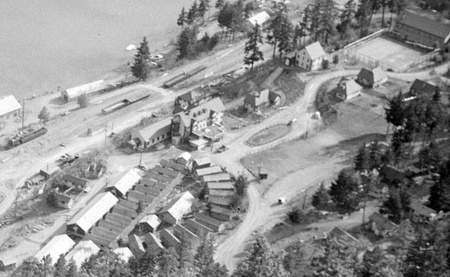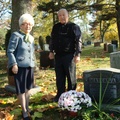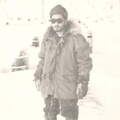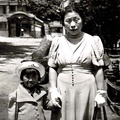Read Part 6 >>
Life in Bridge River
When we were sent to Bridge River (an internment camp where you had to support yourself, money-wise) with one RCMP overseeing the camp, I started thinking how badly we were treated so I used to think about studying hard, become a somebody, and then would hunt down those mean government people and give them the same “medicine” they gave us.
When I heard later that we were classified as Enemy Aliens and Canada didn’t want us anymore I thought that I would have to wander around the world like a countryless gypsy and that really scared me. When you feel unwanted by your country it’s worse than being an orphan.
When the internment time came upon us, the J-town business association organization that they belonged to (certain individuals in there) apparently made arrangements with the government, not having to go to the government’s set up internment camps but instead go to partially vacated ghost towns just beyond the 100-mile limit zone from the coast.
Thinking that the war would end quickly, father chose to go to Bridge River where we had to support ourselves without government help. Some of the organization’s leaders went to Minto, another internment camp which was just over the mountain from us. Although we were not allowed to own cars and were confiscated, once in awhile they came to Bridge River in a black limousine, five men dressed in dark suits with fedora hats to visit all households. I saw my father coming out from his room to hand them some cash. I was always snooping around and seeing gangster type movies before, to me it appeared as if they were collecting protection money like the Mafia or the equivalent Japanese Yakuza—who knows, just my thought at that time.
Radios and cameras had been confiscated too but some families still had them so we weren’t totally isolated. We were allowed to subscribe to the Daily Province so we kept current with the comics too and of course all the “Jap” news. Later, after Bridge River became an official internment camp more people were sent there, especially from Steveston.

Bridge River hydroelectric townsite at South Shalalth - Closeup of hotel and residential area, 1940s. During wartime, the houses were occupied by relocated families, single men and some families. They were housed in the semicircle of smaller buildings, which were barracks originally built for hydroelectric construction. (Wikipedia.com)
Bridge River was almost a vacant small village and was situated on a very steep incline at the bottom of a mountain overseeing Seton Lake and beyond that was another huge mountain. There was no need for barbed wire fences to lock us up as it was almost impossible to escape. At the center of the small village was a small rural school but only for Caucasians; nearby was a community center with two tennis courts; across from it was a Health Clinic for a dentist and a MD; a hotel across from the school; no stores; no churches; and at the entrance to the village was the RCMP’s office.
There were approximately half a dozen Caucasian workers with their families living in simple cottage-like houses in the village and working for the electric power generating plant just at the lake water’s edge. There were approximately three huge water pipes from a lake on top of the mountain to the plant. The PGE train line was along the shoreline of the lake. The line started from Squamish and went to Lillooet. Close to the power station was a train station and a long steep stairway leading up to a three-storied hotel where we lived (most of our relatives and others). There were quite a number of other vacant small homes too and they were utilized as well.
When Bridge River became another official internment camp, many from Steveston were sent there too and they had to stay in small cabins built row after row which used to house the workers that built the power plant and the pipe lines previously, it appeared. Or, it could have housed gold miners as there were still active villages close by still around to mine gold. There was a small grocery store about a few miles away at Shalalth and there was a cube van (it could have been the Maikawa Store truck and part of the deal later as it showed up later?) that went back and forth once a week to take us shopping. Also, without that van the men would have had a terrible time to haul in their firewood as the log cuttings were quite far away from the internment camp. There was also a gas car (size of a train passenger car) that went back and forth to Lillooet, another internment camp too and we were allowed to go to that town as long as one had a permit for the day through the RCMP.
We had a dentist, Dr. Fujiwara and a medical practitioner, Dr. Miyazaki—both interned but when the Lillooet town people heard about Dr. Miyazaki, they took him away! So we had to get permits and had to purchase return train tickets to go to Lillooet to see the doctor from then on. If you are on the right side of the fence, you can make anything happen to suit yourselves, eh? Oh well, it was better for the doctor and his family so we were happy for him and his family. I think he was allowed to stay there permanently and he did, so I was told.
The hotel living was really something! Families had blocks of rooms and shared common bathrooms. There was a huge kitchen with two rows of wood stoves and families had to cook in shifts. Each family had their own designated tables in the dining room. The kitchen sink had to be shared too. As for fridges, each family had to provide their own. The men had to go and chop down trees for the kitchen stoves and also for heating the hotel as well. It was quite a chore as the wood had to be cut months ahead to dry it otherwise it wouldn’t burn properly. There used to be a store on the main floor and that was utilized as a school.
There were two untrained volunteer teachers, Mr. Kido and Miss Takahashi that taught us like in a rural setting school splitting the grades 1 to 4 and 5 to 8. We were only taught for half a day I think or maybe I was asleep for the other half?! Previous to them, Tom Nishio taught grades 1 to 8 like in a rural setting but he suddenly disappeared (he was accepted to go to the University of Western in London. ON). The government didn’t provide teachers to keep us dumb and less educated than the Caucasians.
© 2013 Frank Maikawa





